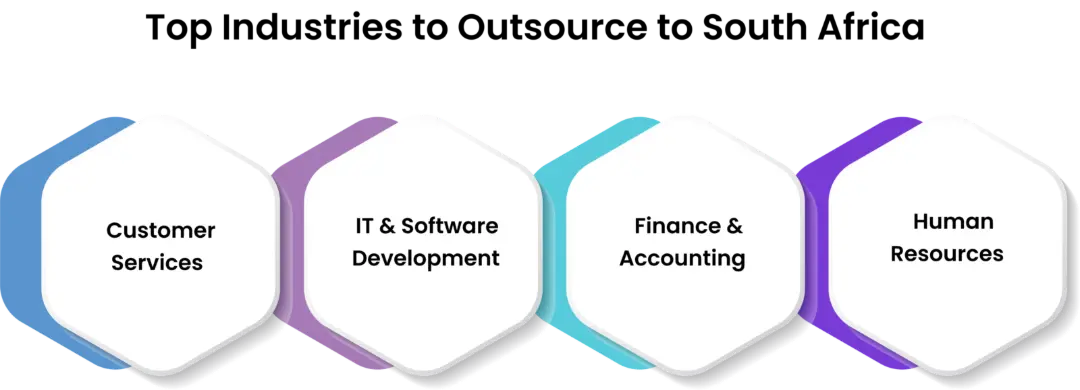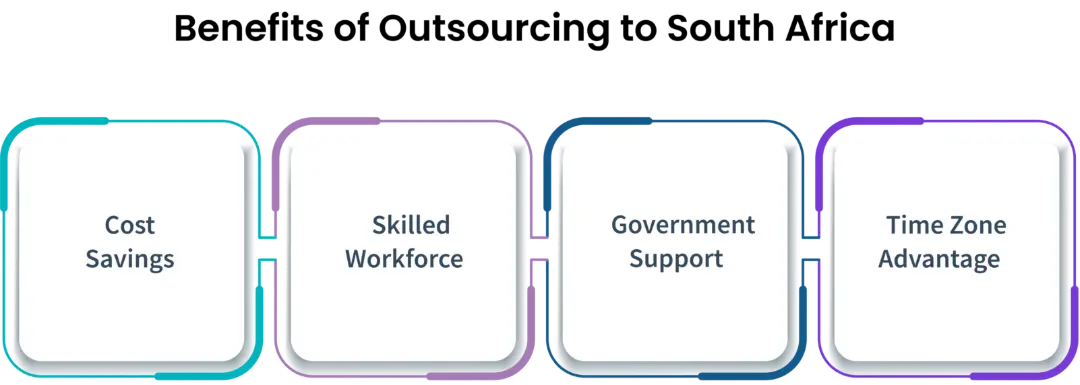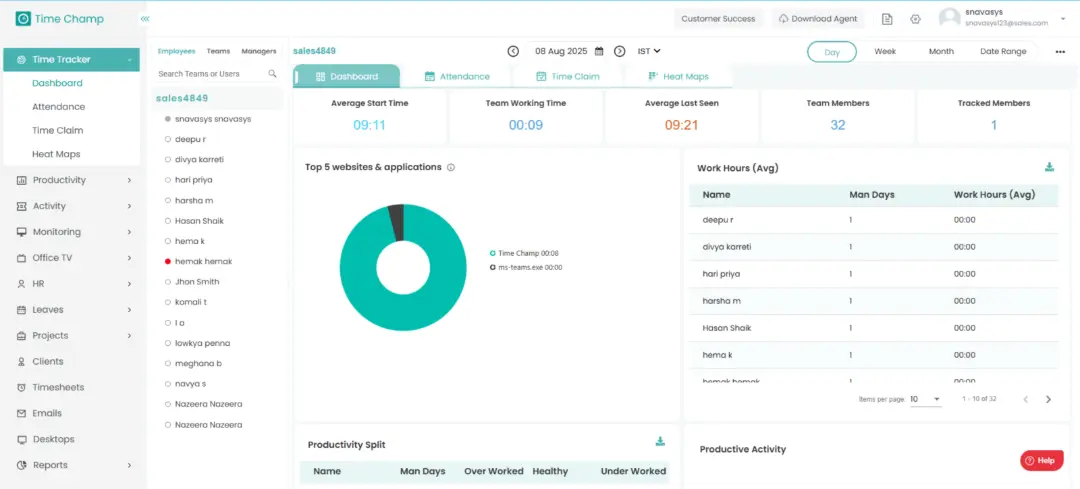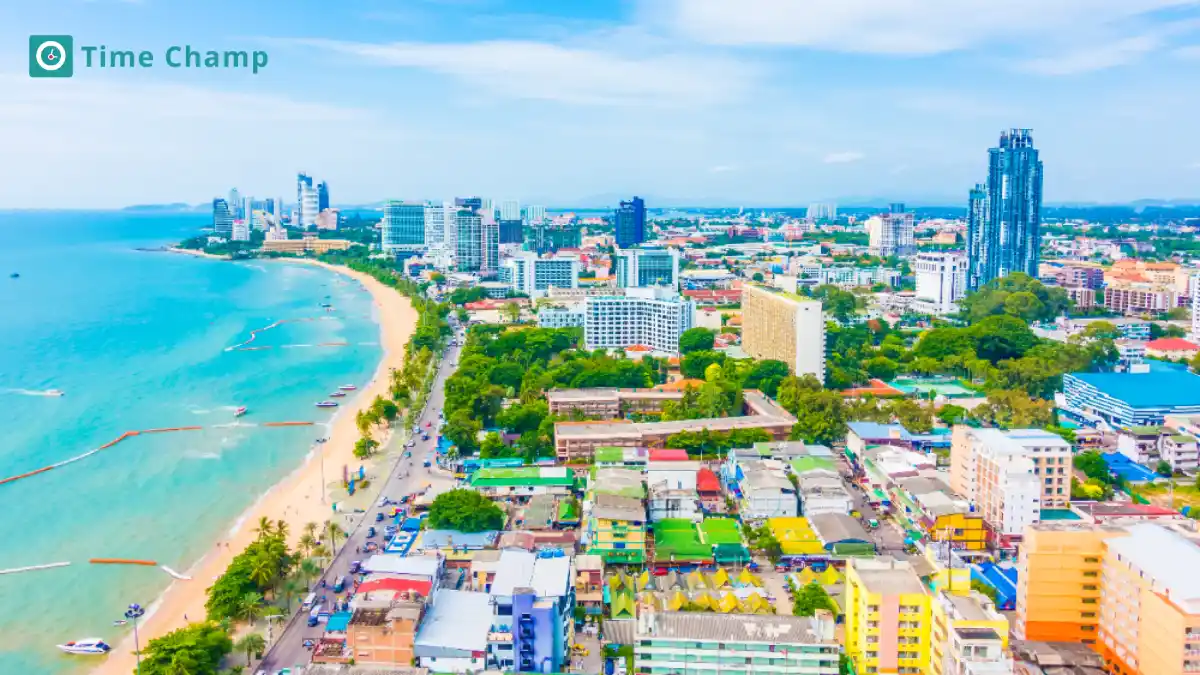According to Statistics South Africa, as of 2025, the average salary in South Africa is 28,289 ZAR/Month, which is approximately 1614.17 USD as per the latest exchange rates. However, average wages in South Africa vary based on factors such as profession, industry, experience, location, and skills.
South Africa is one of the largest economies in Africa . It thrives on its rich natural resources, strong manufacturing, and a rapidly expanding service sector.
In this blog, you will see how much people earn in South Africa and why more companies are considering it as an outsourcing destination. This guide is useful whether you are planning to outsource, or you want to have a proper idea about the salary trends in this region.
What is the Average Salary in South Africa?
As of 2025, the average monthly salary in South Africa is 28,289 ZAR, which is approximately 1614.17 USD according to Statistics South Africa .
The average yearly salary in South Africa is 339,468 ZAR, which is nearly 19280.51 USD per year.
Median Income in South Africa
Based on the latest data from Statistics South Africa's Income & Expenditure Survey (IES) 2022/2023 , the median annual household income in South Africa was 95,770 ZAR (5439.38 USD). This figure represents the middle point of household incomes, meaning half of the households earned more than this amount, while the other half earned less.
It is also important to consider that the level of income differs among different types of households. According to the recent statistics of South Africa, the median income of the male-headed households was 85,804 ZAR (4873.34 USD), and the median income of the female-headed households was 80,109 ZAR (4549.89 USD).
Minimum Wage in South Africa
The minimum wage in South Africa is 28,79 ZAR (163.52 USD) per hour, which is effective from 1 March 2025.
The Minister of Employment and Labour Department of South Africa has announced that, effective 1 March 2025, the National Minimum Wage (NMW) will increase from 27, 58 ZAR (156.64 USD) to 28,79 ZAR (163.52 USD) per hour. This adjustment represents a 4.2% rise and applies to all workers, including previously vulnerable sectors like farm and domestic workers, who have been fully aligned with the NMW since 2022.
Employers are legally required to comply with the updated rates. Violations of the NMW Act can lead to penalties, and the minimum wage may not be reduced or altered through contracts, collective agreements, or changes to working hours.
Exceptions include:
- Workers on the Expanded Public Works Programme, whose hourly minimum increases to 15,83 ZAR (89.91 USD).
- Learners under registered learnership agreements, who are entitled to allowances as outlined by the department
The NMW excludes non-wage payments such as bonuses, tips, transport or food allowances, and accommodation.
Maximum Salary Range
As of 2025, the maximum salary in South Africa is 139,075 ZAR per month, which is approximately 7898.94 USD per month according to the World Salaries.
The highest annual pay in South Africa is 1,668,900 ZAR, which is equivalent to 94787.24 USD per year.
Factors Influencing Salaries in South Africa
In South Africa, employee salaries are influenced by several key factors such as role responsibilities, skill level, industry demand, location, and experience. Understanding what drives salary differences is essential for making smart hiring decisions and building competitive compensation packages.

Industry
Let’s take a look at how average salaries vary across different industries in South Africa.
| Industry | Average Salary Per Month (in ZAR) | Average Salary Per Month (in USD) |
|---|---|---|
| Mining and quarrying industry | 28,537 | 1620.79 |
| all formal non-agricultural industries | 23,522 | 1335.96 |
| Manufacturing industry | 20,445 | 1161.20 |
| Electricity, gas, and water supply industry | 46,033 | 2614.50 |
| Construction industry | 19,843 | 1127.01 |
| Wholesale and retail trade; repair of motor vehicles, motorcycles and personal and household goods; hotels and restaurants industry | 14,982 | 850.92 |
| Transport, storage, and communication industry | 26,976 | 1532.14 |
| Financial intermediation, insurance, real estate, and business services industry | 27,140 | 1541.45 |
| Community, social and personal services industry | 27,684 | 1572.35 |
Occupation
Looking to build a strong team? Here’s what you can expect to pay for top talent across various job roles in South Africa.
| Occupation | Average Salary Per Month (in ZAR) | Average Salary Per Month (in USD) |
|---|---|---|
| Accountant | 23,616.66 | 1341.34 |
| Finance Manager | 64,908.33 | 3686.55 |
| Administrative Manager | 24,750 | 1405.71 |
| Data Entry Specialist | 16,216.66 | 921.05 |
| Office Manager | 27,575 | 1566.16 |
| Technical Project Manager | 38,275 | 2173.88 |
| Search Engine Optimization Specialist (SEO) | 21,475 | 1219.70 |
Source: World Salaries
Experience
Pay increases often depend on how much experience a person has. Here’s how salary growth typically changes at each career level in South Africa.
| Experience | Annual Pay Rise |
|---|---|
| Junior Level | 3% - 5% |
| Mid-Career | 6% - 9% |
| Senior Level | 10% - 15% |
Source: World Salaries
Location
Choosing the right city can make a difference in costs and compensation. Here’s a look at how average salaries compare by location in South Africa.
| City | Average Salary Per Month (in ZAR) | Average Salary Per Month (in USD) |
|---|---|---|
| Bloemfontein | 30,125 | 1710.99 |
| Cape Town | 36,116.66 | 2051.29 |
| Durban | 34,658.33 | 1968.46 |
| Johannesburg | 33,158.33 | 1883.27 |
| Port Elizabeth | 31,525 | 1790.50 |
| Pretoria | 32,691.66 | 1856.76 |
Source: World Salaries
Skills
Skills play a major role in how much someone earns in South Africa. Here’s how salaries differ based on skill level.
| Skill Level | Average Salary Per Month (in ZAR) | Average Salary Per Month (in USD) |
|---|---|---|
| Skilled | 21000 | 1192.72 |
| Semi-Skilled | 5500 | 312.38 |
| Low Skilled | 3300 | 187.43 |
Gender
Understanding the gender pay gap is important for building fair workplaces. Here’s a look at the average salary difference between men and women in South Africa.
| Gender | Average Salary Per Month (in ZAR) | Average Salary Per Month (in USD) |
|---|---|---|
| Male | 32,341.66 | 1836.88 |
| Female | 30,183.33 | 1714.30 |
Source: World Salaries
Cost of Living in South Africa
The cost of living in South Africa can vary depending on your lifestyle and location, but overall, it is significantly higher than in countries like India. On average, living expenses are about 69.6% higher than in India, and rent is around 158.5% more expensive.
Monthly Living Costs (Excluding Rent)
- A family of four needs approximately 38,480.8 ZAR (2185.56 USD) per month.
- A single person requires about 11,091.2 ZAR (629.94 USD) per month.
Housing and Rent
- One-bedroom apartment in city centre: 7,894.38 ZAR (448.37 USD)
- One-bedroom outside city centre: 6,580.73 ZAR (373.76 USD)
- Three-bedroom in city centre: 15,884.56 ZAR (902.18 USD)
- Three-bedroom outside centre: 12,758.29 ZAR (724.62 USD)
Food and Dining
Eating out is affordable for many. A meal at an inexpensive restaurant typically costs around 160 ZAR (9.09 USD), while a three-course dinner for two at a mid-range restaurant is about 700 ZAR (39.76 USD). A cappuccino costs roughly 36 ZAR (2.04 USD), and a fast food meal (like McDonald's) is around 90 ZAR (5.11 USD).
Grocery prices
- Milk (1 liter): 19.55 ZAR (1.11 USD)
- Bread (500g): 17.66 ZAR (1.00 USD)
- Eggs (12): 40.82 ZAR (2.32 USD)
- Chicken fillets (1kg): 82.28 ZAR (4.67 USD)
- Apples (1kg): 27.51 ZAR (1.56 USD)
- Rice (1kg): 28.32 ZAR (1.61 USD)
Transport
Public transport is reasonably priced:
- One-way local transport ticket: 30 ZAR (1.70 USD)
- Monthly pass: around 825 ZAR (46.86 USD)
- Gasoline per liter: 22.71 ZAR (1.29 USD)
- Taxi fares start at 20 ZAR (1.14 USD), and travel per km typically costs 19 ZAR (1.08 USD).
Utilities and Internet
- Basic utilities for an 85m² apartment cost around 2,009.69 ZAR (114.14 USD) per month.
- Internet (60 Mbps, unlimited data): about 734.10 ZAR (41.69 USD) per month.
- Mobile phone monthly plan with calls and 10GB+ data: 580.46 ZAR (32.97 USD)
Buying Property
- City centre apartment: 17,819.68 ZAR (1012.09 USD) per square meter
- Outside city centre: 13,737.07 ZAR (780.21 USD) per square meter
Top Industries to Outsource to South Africa
South Africa has become a top choice for companies looking to outsource their services. With a skilled workforce, strong English language skills, and growing tech infrastructure, it's a smart destination for outsourcing in several key areas.

Customer Services
South Africa is known for its excellent customer support services. Many international firms prefer to establish call centers or outsource their customer services to this place. This is primarily due to the fact that South African agents are sociable, fluent in English, and familiar with various accents. They are also trained in solving problems fast and making the customers feel listened to and appreciated.
IT & Software Development
The country is emerging as a technology and innovation hub with many skilled developers, engineers, and IT professionals. South African teams can deal with anything, whether it is creating websites, developing mobile applications, or even working on entire software projects. Businesses can save money without compromising quality by outsourcing to the tech industry in South Africa.
According to a GlobeNewswire report, South Africa has a strong growth in cloud computing, software consulting, and development, and this has made it one of the leading business process outsourcing destinations in Africa.
Finance & Accounting
Many companies depend on South Africa for financial operations such as bookkeeping, payroll , and accounting . The country has experts who are familiar with international finance standards and able to manage both simple and complicated reports. This helps businesses to be organized, save on costs and concentrate on the growth.
According to a report by Research and Markets, the finance and accounting service segment will expand at a compound annual growth rate (CAGR) of 13.6 % in the South Africa’s BPO market during the forecast period. The reason behind this expansion is the desire of banks and other financial institutions to become more cost-efficient by outsourcing.
Human Resources
It is becoming more popular to outsource HR activities to South Africa. Local experts can take care of hiring, training, payroll management, and employee support. This enables firms to handle their employees without any problems as they concentrate on their core objectives. South African teams provide cost-effective and reliable support.
The 2020 South Africa HRO Market Intelligence Report by BPESA provides insights into the human resource outsourcing landscape in South Africa, highlighting its capabilities and growth potential.
Benefits of Outsourcing to South Africa
Outsourcing to South Africa has become a smart choice for many businesses around the world. Here are some key reasons why:

Cost Savings
According to a report by Grand View Research , South Africa offers competitive operational expenses that have been relatively lower as compared to those in developed markets like the UK, the U.S., and Australia. This price advantage will make it an attractive alternative to firms that want to cut down on their costs without affecting the quality of the services they provide.
Skilled Workforce
South Africa has a large talent pool of skilled workers whose English capabilities are strong and culturally aligned with the Western countries. This not only makes communication easy but also reduces friction in training or language, especially in customer services or tech-based positions.
Additionally, South Africa ranks 11th out of 116 countries in Education First’s English Proficiency Index , outranking many other prominent outsourcing locations.
Government Support
The South African government has taken a very active role in supporting the growth of the outsourcing industry. Its greatest way of doing this is in the form of the Global Business Services (GBS) Incentive program . It provides finance to the businesses which have created jobs in sectors such as customer service, technical support and other business services particularly for youth employment.
The government has been investing more than R3 billion in this industry since 2016. Through that funding, companies have employed more than 31,000 individuals in the entire South African region. Such initiatives facilitate the establishment of outsourcing units by foreign firms in South Africa easily and at a reduced cost.
Time Zone Advantage
South Africa operates on South African Standard Time (SAST) , which is UTC+2. This is the time zone that is inversely close to various European and Middle East nations. This makes it easy to work together in real time during the normal working hours. For example, when it is 9.00 AM in South Africa, then it is 8.00 AM in the UK and 10.00 AM in Germany. Such overlap will enable easy interaction and coordination with European partners.
The time zone of South Africa is beneficial to the American companies. Although a time difference exists, the overlap between work in South Africa and the U.S. working hours allows South African teams to offer more support in early mornings or late in the night in the U.S. This makes South Africa a perfect place to establish workplaces where businesses provide services 24 hours a day.
Boost Your Outsourcing Team's Productivity Using Time Champ
If you work with an outsourcing team in South Africa, Time Champ can help make their work better, faster, and more organized. It gives you a clear view of what your team is doing and helps everyone stay focused without feeling stressed.

1. Track Time and Work Automatically
Time Champ watches how much time each person spends on tasks. Your team does not need to fill out forms or send updates manually. The system records everything in the background. This means your team can focus on their work, while you get real-time updates without asking.
2. Use Workforce Analytics to Make Smarter Choices
Time Champ gives you clear workforce analytics . You can see when your team is most productive, which tasks take the longest, and where time is being lost. These insights help you make better decisions about planning, hiring , and team support. It also helps spot patterns like overwork or downtime, so you can balance workloads and improve overall performance.
3. Manage Projects with Clarity
Time Champ makes project management simple and clear. You can create tasks, assign them to team members, and set deadlines. It shows you the progress of every task and every project in one place. You always know what is done, what is in progress, and what needs attention. This helps you manage your team better and keep every project on schedule without stress.
4. Reduce Delays and Missed Deadlines
With reminders and alerts, Time Champ helps your team finish tasks on time. The system sends gentle notifications to remind team members about upcoming deadlines or work that is taking too long. This helps keep projects moving without delays.
5. Monitor Work without Micromanaging
Time Champ lets you see how your team works through smart monitoring features like app and website tracking, screenshots, live screen monitoring ,screen recordings , keystroke activity, and mouse clicks. This helps you understand work patterns, check productivity, and support your team without asking for constant updates.
6. Simple Reports for Smarter Decisions
Time Champ gives you simple and clear reports. These reports show you how your team is performing each day or week. You can see where time is going, what is slowing down progress, and which tasks are taking longer than expected. With this information, you can plan better and help your team do their best.
Final Words
South Africa offers a unique advantage for outsourcing, because of its skilled workforce and the competitive average salary in South Africa. Whether you are managing a team or expanding your business, it is a strategic move that offers both quality and cost-efficiency. With productivity tools like Time Champ, you can stay in control, streamline workflows, and ensure your team remains focused and consistently delivers results.
Frequently Asked Questions
Yes, earning 40,000 ZAR (2271.85 USD) per month is considered a strong salary in South Africa. It’s above the national average and allows for a comfortable lifestyle in most cities, covering housing, transportation, savings, and leisure.
South Africa's average monthly salary is approximately 31,058 ZAR (1763.98 USD). This is higher than in neighboring countries like Namibia (USD 1,074) and Botswana (USD 685), but lower than in Zimbabwe (USD 2,000).
Yes, the South African government actively supports the growth of the outsourcing sector through various incentives, including funding programs and policy support, to attract international companies and create jobs locally.
Yes, inflation does have an impact. As the cost of living rises, employees often expect salary increases to maintain their purchasing power, and businesses need to factor this into their compensation planning.








